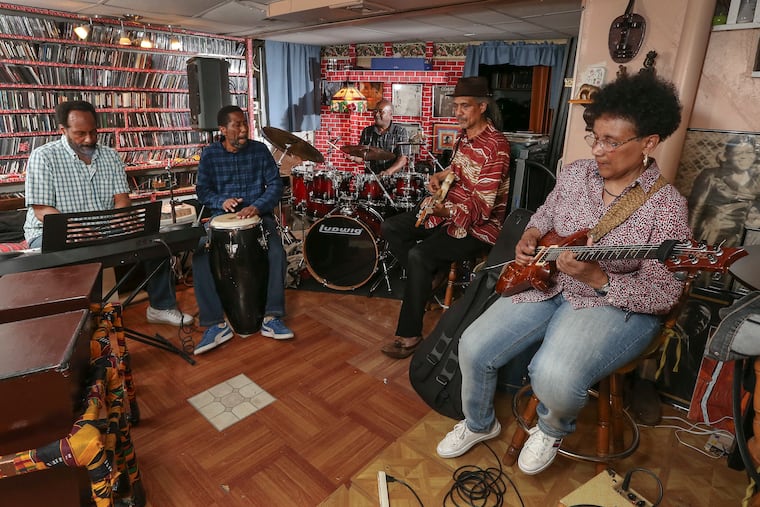Marshall Allen’s 95th birthday present? The reunion of Sounds of Liberation, a band that hasn’t all played together in four decades.
They'll be celebrating Sun Ra leader Marshall Allen's 95th birthday

Sometime in the early 1970s, the avant-funk collective Sounds of Liberation was performing at Pickett Middle School in Germantown when guitarist Monnette Sudler looked down to see drops of blood pooling at the feet of bassist Billy Mills. Barely out of high school, Mills hadn’t yet formed the protective calluses necessary to play with the kind of intensity the band required.
“The music was poppin’, though,” Mills recalled last week, “so I didn't want to stop.”
Laughter echoed through drummer Dwight James’ Mount Airy basement, as it did frequently while the reconvened Sounds of Liberation reminisced and rehearsed. The concert that night when Mills played through bleeding fingers, more than four decades ago, also featured fellow Germantown-based experimentalists the Sun Ra Arkestra. The same bill will share the stage at Union Transfer on Thursday, as the Arkestra celebrates the 95th birthday of its tireless longtime bandleader, alto wizard Marshall Allen.
Sounds of Liberation has its own reasons for celebrating this week. Long represented only by a single self-titled album released in 1972 (an obscure rarity until a 2010 reissue on Porter Records), the band is gearing up for the release of its epically long-overdue follow-up, a never-before-released session recorded in 1973 at Columbia University. The band itself hadn’t heard the tapes in all those years, until their recent discovery in James’ basement.
“I really didn’t start listening to it till he started fumbling through my stuff down here,” James joked, pointing a drumstick across the room at Max Ochester, owner of the Philly record store Brewerytown Beats.
“Dwight had about 20 reel-to-reel tapes in his basement,” Ochester said. “One in particular had the entire band listed out, with one song, a 1971 date, and ‘Recorded in James Brown’s studio.’ All of which turned out to be completely false.”
After a good bit of sleuthing and jogging of memories, Ochester pinpointed the correct date and established the Dogtown Records imprint to release the music. He also tracked down the artist who’d created the cover of the original Sounds of Liberation album. Still living in Germantown at 93, Leroy Butler contributed the striking artwork for the new release.
“This project is all about telling the history of Philadelphia jazz,” Ochester said. “Sounds of Liberation was the scene at the time, the birth of what they termed ‘Black Liberation Music.’ This was youth playing jazz that really impacted their careers and their lives.”
Sounds of Liberation came together in 1971, a congregation of young musicians who shared a love of soulful, free-ranging funk, and spiritual avant-garde jazz. Many of the members would go on to be linchpins of the Philly jazz scene for decades, often in collaboration with one another.
At the core of the ensemble was vibraphonist Khan Jamal, who will attend Thursday’s concert, though his health prevents him from performing. Through a mutual friend, he was introduced to Sudler, who remains an active and inventive player with a wide-ranging palette. (On July 20, she’ll convene an all-star group of guitarists, including Mark Whitfield and Sheryl Bailey, at the Clef Club.)
“I called Khan and asked him if he wanted to jam,” Sudler remembered. “He brought his vibes over and we played in my mom’s living room. That’s how it started. We all lived within a few blocks of each other, and we started rehearsing in Khan’s garage after that.”
James had known Jamal (then still known as Warren Cheeseboro) since their junior year at Edison High School. Following James’ service in Vietnam, the two reunited in less than auspicious circumstances at Geno’s Empty Foxhole, the jazz club that had sprung up in the basement of St. Mary’s Church, Hamilton Village.
They encountered each other in the restroom, James said with a laugh. “I looked at him and said, ‘Warren!’ He said, ‘Dwight! You still playing drums?’ I said, ‘Yeah, come on over.’ We’ve been playing together ever since.”
The band grew to incorporate percussionists Omar Hill and the late Rashid Salim, Mills (who has since switched to keyboards, perhaps to avoid any further damage to his fingers) and the audacious sax legend Byard Lancaster, who died in 2012. In Sounds of Liberation, they combined exploratory funk grooves with a socio-political bent that manifested through community outreach efforts.
“During that time, that’s what was going on,” Sudler said. “The black power movement, community festivals, things like that.” Mills added, “We were playing a lot of those festivals with really powerful speakers, so a lot of that stuff would rub off on us.”
Sounds of Liberation has reunited on a few occasions over the years, though Thursday’s concert will be Mills’ first appearance with the band since their 1970s heyday, while lost and ailing members will be replaced by new and longtime collaborators including saxophonist Elliott Levin and bassist Charles Veasley. It’s the latest chapter in what James warmly referred to as “an adventure.”
“Sounds of Liberation was more than just playing music. It was a friendship; it was a family. I don’t care how much we argued off the stage, it was magic when we got on the stage.”
MUSIC
Sounds of Liberation / Sun Ra Arkestra
8 p.m. Thursday, June 13, Union Transfer, 1026 Spring Garden St. Tickets: $20 general admission, $100 VIP. Information: 215-232-2100, arsnovaworkshop.org